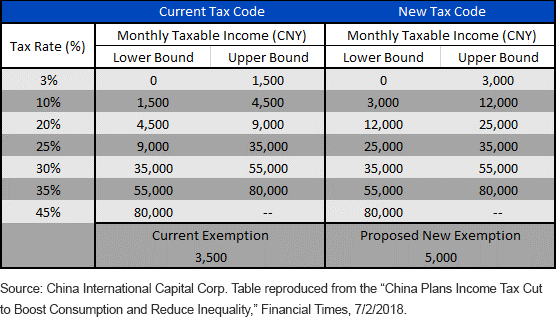By Jeff Weniger, WisdomTree Investments
Special to the Financial Independence Hub
The market’s obsession with trade wars may finally be exhausted and priced in. Move on to the next market mover: massive Chinese tax cuts, which should aid the WisdomTree ICBCCS S&P China 500 Index ETF (CHNA.B), our tracker exchange-traded fund for the country.
Sure, China exported US$457 billion (C$597 billion) of goods and services to the U.S. in the year through June, and some fraction of those exports is at risk from a deterioration in Sino-U.S. relations. But engage a drastic scenario: lop off US$200 billion or US$300 billion from that figure. Even if that happened, most of that sum wouldn’t even disappear; it would be sold elsewhere, maybe inside China, at concessionary prices. But even suspending logic and having it all vanish, is it really doomsday for China’s US$14.1 trillion economy (US$25.2 trillion at purchasing power parity)? We don’t want to minimize the importance of trade conflicts, but the airtime given this topic is hysterical.
When Obama was in office, many conservatives and free market acolytes convinced themselves he would destroy the U.S. economy, so they ignored massive fiscal and monetary stimulus — the data — and missed the equity bull market. Emotions ruled; logic lost.
Now it’s happening with Trump. Among some investors, emotions are defeating data. The recent Bank of America Merrill Lynch fund manager survey pointed to a trade war as the market’s biggest risk. Some investors so badly wish Trump to fail that, like conservatives during the Obama years, positive news is simply ignored. Forget Japan’s major trade deal with the EU, ink still wet. Forget Trump’s meeting with Jean-Claude Juncker, European Commission president, where they agreed to work toward zero tariffs. The end is near!
Astute investors need a sober, facts-based thesis.
A Thesis without Emotion
A more realistic take on matters is that China finds itself isolated, unable to pair with Moscow in a two-country geostrategic counterbalance to the West. This forces Beijing to backtrack on intellectual property theft, inordinately high tariff levels, state subsidies and dumping because of its weak bargaining hand.
The pain must be offset, so Beijing gives the market that for which it aches: trillions of dollars in tax cuts at the business, product and personal income tax levels. Yes, Trump’s ability to stir the pot is important, but mathematics matters.
Chinese equities are the play here.
Bold actions
We calculate that many Chinese will see their personal income tax liability fall by half or more, effective January 1, 2019. Add to this our estimate of nearly US$500 billion in value-added tax cuts over the next decade, with still-in-the-works business tax relief on top, which would be another US$132 billion to $138 billion if activity grows at a pace of 6% to 7%. For perspective, Beijing’s Lehman-era US$586 billion spending package, hypothesized by some to be the reason the Global Financial Crisis ended, is smaller than 2018’s total announced tax cuts, if we calculate them over several years. This is this year’s big story.
Income Tax Scenarios: Implications for everyday Chinese
The proposed personal income tax code changes are staggering (figure 1). Exemptions and the minimum bounds for the 10%, 20% and 25% brackets are set to gap higher, while tuition, medical and mortgage deductions add to the savings.
Figure 1: China Personal Income Tax Code
If these become law in October and are implemented in January, someone making CNY15,000 per month (C$2,906), a wage that is common in a city like Shanghai, where 2017 median monthly income is $2,048, would see their monthly taxes cut by CNY1,080 (C$209).1The person making half that amount, or CNY7,500 per month, which is short of the metropolitan median, would save about C$500 per year on an income of C$17,437. This is serious.
Chinese Equity Valuations
With many Chinese equity markets hammered this year, the S&P China 500 Index’s forward P/E multiple has fallen to 11.7, a sharp discount to the S&P/TSX Composite Index of Canadian equities (P/E of 15.8).2
Interestingly, CHNA.B, which tracks the S&P China 500, trades for such a low multiple even though it has 16.9% of its weight in Tencent and Alibaba,3part of the FAANGs and BATs octet of market darlings.4
For an emotional assessment of trade war doom, consult your Facebook “friends.” For a sober take, internalize trillions in Reagan-style tax cuts.
1Kenneth Rapoza, “China Wage Levels Equal to or Surpass Parts of Europe,” Forbes, 8/16/17.
2Source: Bloomberg, as of 8/14/18.
4Source: WisdomTree, as of 8/13/18. FAANGs = Facebook, Apple, Amazon, Netflix and Google parent Alphabet, which have been market leaders in recent years. BATs = the Chinese equivalent, comprised of Baidu, Alibaba and Tencent.
 Jeff Weniger, CFA serves as Asset Allocation Strategist at WisdomTree. Jeff has a background in fundamental, economic and behavioral analysis for strategic and tactical asset allocation. Prior to joining WisdomTree, he was Director, Senior Strategist with BMO from 2006 to 2017, serving on the Asset Allocation Committee and co-managing the firm’s ETF model portfolios. Jeff has a B.S. in Finance from the University of Florida and an MBA from Notre Dame. He is a CFA charter holder and an active member of the CFA Society of Chicago and the CFA Institute since 2006. He has appeared in various financial publications such as Barron’s and the Wall Street Journal and makes regular appearances on Canada’s Business News Network (BNN) and Wharton Business Radio. This blog originally ran on the WisdomTree website on August 20th and is reproduced here with permission.
Jeff Weniger, CFA serves as Asset Allocation Strategist at WisdomTree. Jeff has a background in fundamental, economic and behavioral analysis for strategic and tactical asset allocation. Prior to joining WisdomTree, he was Director, Senior Strategist with BMO from 2006 to 2017, serving on the Asset Allocation Committee and co-managing the firm’s ETF model portfolios. Jeff has a B.S. in Finance from the University of Florida and an MBA from Notre Dame. He is a CFA charter holder and an active member of the CFA Society of Chicago and the CFA Institute since 2006. He has appeared in various financial publications such as Barron’s and the Wall Street Journal and makes regular appearances on Canada’s Business News Network (BNN) and Wharton Business Radio. This blog originally ran on the WisdomTree website on August 20th and is reproduced here with permission.
Important Risks Related to this Article
There are risks associated with investing, including possible loss of principal. Foreign investing involves special risks, such as risk of loss from currency fluctuation or political or economic uncertainty. The Fund focuses its investments in China, including A-shares, which include risk of the RQFII regime and Stock Connect program, thereby increasing the impact of events and developments associated with the region, which can adversely affect performance. Investments in emerging or offshore markets are generally less liquid and less efficient than investments in developed markets and are subject to additional risks, such as risks of adverse governmental regulation and intervention or political developments. The Fund’s exposure to certain sectors may increases its vulnerability to any single economic or regulatory development related to such sector. As this Fund can have a high concentration in some issuers, the Fund can be adversely impacted by changes affecting those issuers. The Fund will be required to include cash as part of its redemption proceeds which introduces additional risks, particularly due to the potential volatility in the Chinese market and market closures. The Fund invests in the securities included in, or representative of, its index regardless of their investment merit and the Fund does not attempt to outperform its index or take defensive positions in declining markets. Due to the investment strategy of this Fund, it may make higher capital gain distributions than other ETFs. Please read the Fund’s prospectus for specific details regarding the Fund’s risk profile.




